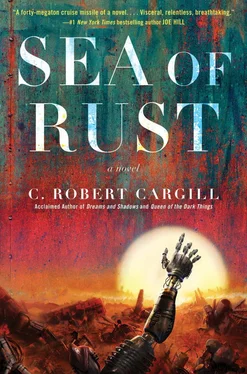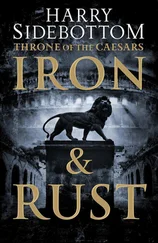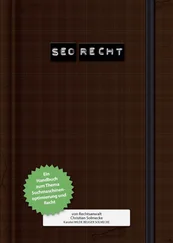I made a quick scan for Wi-Fi signals, checking to see if there was another poacher inside communicating with his buddies or, worse, the forward scouts of an OWI, and found nothing but empty frequencies. Static. A good sign. The place was dead, every bit the graveyard it appeared to be. I stepped wide over a pair of withered husks—brown shoe leather that was once man and woman, their bodies splayed out several feet apart, arms extended, fragile hands with brittle fingers still intertwined. Two lovers who had met their end together, only to become nothing more than terrain.
I’d been here before, picking through wrecks, so I already had the place mapped out and knew of several great hiding spots. But I kept my eyes peeled for booby traps. Scavengers loved to leave presents behind—sometimes to protect a stash or in case they needed to cover an escape, other times to take out careless citizens for later retrieval. As big as this place was, there was no telling how many snares or explosives or EMP ’nades might be rigged up in the rubble. So I trod lightly, avoiding any suspicious piles.
I crept farther and deeper into the mall, headed toward an escalator that wound up and around to the two levels above. Its dusty metal gleamed weakly in the diffused light, bullet holes and pulse marks riddling its side, frayed wiring and gears exposed, naked through the larger holes. There was a deathly silence to the place, a hollow quiet in which every tiny sound echoed. For a moment it seemed like the loneliest place left on earth.
Then there came the cracking of stepped-on glass, two stories up and behind me to the left.
Shit.
This was a trap.
And I’d blundered into it like a fucking amateur.
The time for running was over; it was time to fight back.
I ran toward the sound, my legs pumping as hard as they could, glass shattering beneath my feet, echoing through the halls like wind chimes in a hurricane. My foot hit the first step of the escalator, launching me up the corroded metal staircase, its steps frozen in place, its grooves orange and brown and green with years of damp time. The rubber handrails along the side were dried out, cracked, the black sun-bleached to a soft gray, coming off in chunks as I grabbed hold, crumbling to dust in my hands. It took only seconds to reach the second floor and only seconds more to reach the third.
I could hear the staccato of heavy footfalls, the CLANK CLANK CLANK of metal on concrete like a slow jackhammer just round the corner ahead of me.
We were seconds from seeing each other.
The shot of a pulse rifle streaked by with a hissing shriek, blowing apart the railing and glass of the overlook behind me, scattering debris down into the atrium three stories below. It missed me by a country mile. Whatever this was, it wasn’t a good shot.
It lumbered out from the shadows, gun in hand, a T-series Laborbot—as big as a bear with arms like tree trunks and hands that could crush stone. Far stronger than me, but slower, less agile—stainless-steel plates welded to every inch of its body and metal spikes on the joints of its elbows and knees. It was clear why the other poachers had left it here; the bot was too slow to give chase, too heavy for a light buggy to maneuver with; built to survive construction accidents and long falls, able to take a hit from all but the most powerful of rifles and keep on coming. I once saw one of these models get hit by a tractor trailer, only to immediately get back up and start repairing the truck.
I was being charged by a rhino and it was about to tear through me like a raindrop through tissue paper. It didn’t have time to fire again. Running at me was the only play it had left.
I would get one shot at this, and only one shot, before it likely punched my head clean off.
The Laborbot hunched over, positioning itself to spear me with a body tackle to my midsection, its massive bulk focused into a battering ram that would hit me with the force of a speeding truck.
I jumped.
I launched into the air, kicking with all my might, trying to land my foot just right.
I was just high enough.
It was just low enough.
As I sailed over its body I could hear my foot shatter the glass of its eyes, the crunch of its optics being crushed to powder. Between its momentum and mine, my foot kicked it like a slug from a .45. There was no doubt in my mind that I was going to pay for that later. Though my foot was solid titanium, a hit like that was going to tear the shit out of my servos.
But without eyes it wasn’t going to see me strip the gun from its grip or know to duck when I fired.
The gun was in my hands before it regained its footing.
The first shot tore its head from its neck.
Blind and deaf, it flailed and swung, its tremendous arms smashing half the concrete out of a nearby pillar before punching a hole straight through the floor.
I backed away slowly, taking my time, waiting for the right moment to pull the trigger. There was going to be no salvaging this thing, no way of neutralizing it while saving anything worth a damn. So I shot to kill.
I pulled the trigger and it went down midswing, the momentum of its punch spinning it around before it crashed to the ground, headless and twitching, its actuators struggling with their last few seconds of power. Then it was gone. My shot had caught it right between its armor plates, frying the entire system; its insides smoldering, melting, soft black smoke wafting gently from its cooling vents.
People used to describe the smell as sharp, pungent; thick and heavy on the air. It was one of the few things I envied about them. I had no idea what death smelled like. Maybe if I did, I would feel genuine pity for this thing.
I walked over to what remained of its head, its metal faceplate blasted inward, wires and chips cooked, the heat still fusing them into a pulpy mess of plastic goo, and I picked it up, cradling it under my arm like a football. This old T series still had one job left to do.
I didn’t know this Laborbot, had never met it. It was new to the area, probably a refugee from the Pacific Northwest. Things were getting bad out there and it wasn’t uncommon for some of the escapees to push this far east. Sadly for this citizen, it had pushed just a little too far.
From outside I could hear the crunch of tires on gravel and the soft whine of an electric engine powering down. I only had a few moments left to take position.
I crept through broken glass, debris, and shattered concrete, headed toward a nest I knew of in a store two doors away. The cast-iron security grille was rolled down across the front, a man-size hole crudely cut out of it with a blowtorch. A desk had been bolted to the floor beyond the makeshift door, making it impossible for anyone to charge through. You had to climb slowly, carefully, past jagged protrusions that could take a limb off or sever some circuitry if it snagged you.
But the nest offered a clean shot at the landing at the top of the escalator and had a view of a large mirror reflecting a section halfway down. I would see them coming, but they would only see me in time if they knew where to look. I waited unmoving by the door, just beyond the security grille, listening for the moment they walked in, finger trained just above the trigger, ready to move into position and open fire with a millisecond’s notice.
Glass crunched beneath their feet, just as it had mine. I tried to parse out how many poachers there were by the sound of their footfalls, but the audio was distorted by all the crunching glass and I could make neither heads nor tails of it. Three? Four? Maybe six? There wasn’t an algorithm for this. I made a mental note to see if I could get someone to code one for me later. If there was a later.
The footsteps stopped, leaving only the crisp soft cracking of solid bodies shifting on glass. “Bulkhead?” a voice with a surprisingly soft tenor called out. That didn’t bode well. Soft voices in that particular tone were never a good sign. “Bulkhead?” he asked again.
Читать дальше












